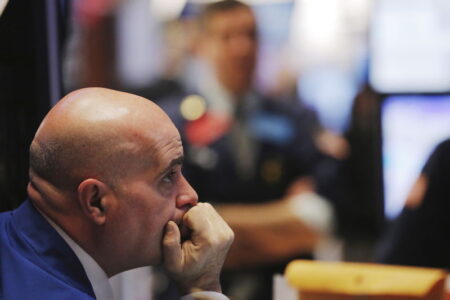By Pete Schroeder and Lananh Nguyen
NEW YORK (Reuters) – As Wall Street financiers gathered in downtown Manhattan on Wednesday, their optimism about President-elect Donald Trump’s deregulatory agenda was tempered by uncertainty over his personnel and policies.
Bankers were still bullish on deals. They expected friendly regulators to be installed atop key agencies, sweeping away onerous regulations. Yet one week after Trump’s election victory, industry experts shifted their focus to Trump’s financial policies and how they would play out.
” can’t have everything,” Erika Najarian, an analyst at UBS, told the industry conference on Tuesday. While they are benefiting from “wide open” capital markets, “we have to sort of temper enthusiasm when it comes to loan growth for next year” if interest rates stay higher for longer.
Attendees also speculated about Trump’s potential roster of financial regulators and predicted which companies stood to gain most from the new regime.
“The administration is going to be this interesting mix of kind of laissez-faire, plus pro-business, plus populism,” said Jon Lieber, Eurasia Group’s head of research for the U.S. “How those three things interact are going to be happening in weird ways.”
For instance, Trump is expected to scrap a proposal for higher capital requirements that was strongly opposed by banking giants. And attendees argued banks are well-positioned to push for further relief and rollbacks of Democratic priorities as economic growth remains a top Trump pledge.
“Sometimes you will win and sometimes you will lose, but the CEOs frankly have to have the backbone to fight the regulators when they think they are right,” said Jelena McWilliams, the former chairman of the Federal Deposit Insurance Corporation in Trump’s first term.
But the incoming president’s populist leanings could see him do things like extend a Biden-era fight against banks’ so-called “junk fees” that are unpopular among consumers. While they did not expect it to become reality, several attendees noted Trump’s campaign promise to cap credit card interest rates as the type of populist pitch he is capable of making.
Meanwhile, banks that are already in the regulatory penalty box are unlikely to be given easier treatment by the new administration, attendees said, and intense scrutiny of lenders’ efforts to prevent money laundering and criminal financing will also remain high as geopolitical tensions escalate between the U.S. and its adversaries.
Trump’s focus on crypto could also increase competition for banks, said Aaron Klein, a senior fellow in economic studies at the Brookings Institution.
While lenders may get a short-term boost in profits from lighter regulation, their business could be eroded in the long term if financial activity migrates to more lightly-regulated areas such as the fintech or crypto industries, Klein said.
climbed to a record $89,982 on Tuesday on expectations that Trump will embrace crypto.
“The incoming administration has an opportunity to deliver on campaign promises,” said Dante Disparte, the chief strategy officer and head of global policy at Circle, the principal operator of stablecoin USDC.
Read the full article here
















